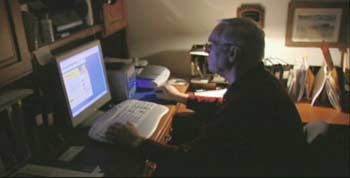
Gil Thibeau checks his retirement portfolio from his home computer.
When Gil Thibeau, 64, retires sometime in 2006, he expects to have saved about $450,000 toward his retirement. It's not a princely sum -- experts recommend saving 10 times annual salary -- but he feels it's enough to live "comfortably." He's done better than most saving for retirement; however, he has still made some common mistakes that have cut into his savings.
When Thibeau joined computer chip maker National Semiconductor as a customer service engineer in the mid-'80s, he began contributing 6 percent of his salary to his company's 401(k) plan, which they matched dollar-for-dollar. Over the next 14 years, as his salary increased from $50,000 to $93,000, he was able to contribute even more -- up to 10 percent of his annual salary.
Thibeau, who holds a Masters degree in Business Administration, knew that it would be critical to his retirement that he not only save, but that he manage his investments wisely. "I did a lot of research on the computer and talked with other people who were in different [retirement] plans and what was working best for them," he says. He checks his investments at least quarterly and diversified his portfolio among the stock market, savings and company stock.
His financial acumen proved essential when the stock market took a nosedive after 9/11, causing his 401(k) to lose 60 percent of its value. "It's back-plus now," he says, "I picked the right stocks and the right investments." Still Thibeau realizes he was lucky. "I could be sitting on half of what I am right now. So there's a risk in 401(k)s."
Thibeau has prospered despite making some classic investing mistakes. At present, he has a third of his 401(k) invested in National Semiconductor stock; financial planners suggest investing no more than 10 percent of your retirement in your own company. Thibeau, like many Enron employees, discovered the peril of putting his eggs in one basket. National's stock value plummeted following 9/11 -- from about $80 per share in the late-'90s down to $11 a share -- costing Thibeau not only part of his nest egg but also his job.
At age 60, Thibeau found himself in the job market -- for several years. "When you are 60 and gray-haired, you send those resumes out, and you'll get interviews … but you're over-qualified or you make too much money," explains Thibeau "… [I]t's against the law for people to discriminate for age, but I believe it still happens."
After applying for several comparable jobs, he finally took a position with Aetna, a health insurance company, as a customer service representative, making only $30,000 a year. "I took a slam in salary, but it's what I needed," explains Thibeau. "The COBRA [interim health insurance] was running out, and it got to the point where I had to bite the bullet and take a job to give me some benefits."
Even today, soaring health care costs are the primary factor influencing Thibeau's decision to stay in the work force. Although he could have retired in 2005, he plans to stay on with Aetna for another year to qualify for their group health insurance program, which extends coverage to retirees who have been with the company at least five years.
"I'm seeing that the biggest cost in the future is going to be health care," he says. "Somebody who's going to live 20 years [in retirement], … it may cost them $250,000 or more in medical expenses. That's enough to tell you that maybe half a million [in retirement savings] isn't going to be enough."
Gil Thibeau is not maudlin about the state of his retirement account, but he would do things differently if he were starting over. "My retirement is half a million because I got started late," he says, "If I had started earlier, I would have set my target at $1 million, but I waited too long." By not contributing to his retirement until he was already in his 50s, Thibeau missed out on 20 years of compounded interest. To make up for last time, he pursued aggressive investments -- investments that lost half their value when the stock market crashed.
Today he is constantly worried about what might happen to his account if another disaster strikes: "The only thing that worries me right now is what happens if [there's a disaster] in the world economy with oil, or another terrorist attack that will cause that whole thing to collapse again? " Approaching 65, Thibeau doesn't have enough time or a high enough salary to build his account back up again. "I try to tell my son to start saving now, so when he gets to my age he isn't going to have to worry about that," he says. "If I had started a lot earlier, I wouldn't have to be worrying about that today."